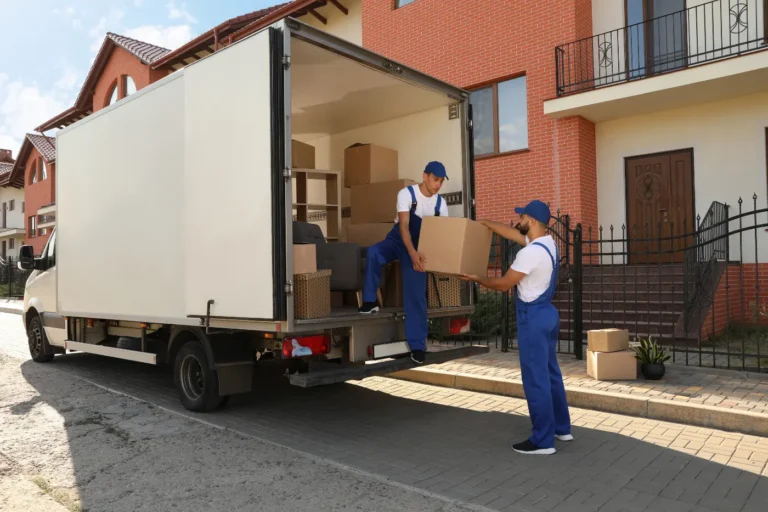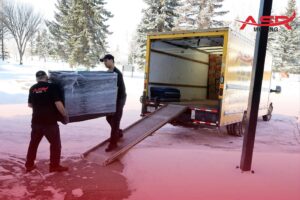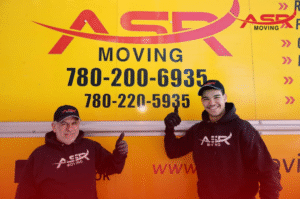If you’re planning a move, you’ve probably already realized how overwhelming it can get. Between packing, changing your address, and figuring out logistics, the last thing you want is to worry about whether your movers are actually reliable.
Not all moving companies are the same, and picking the wrong one can lead to delays, damaged stuff, or surprise charges. Therefore, you should ask the right questions before booking anything.
We list down 21 questions to ask when moving to make sure you’re hiring a company that’s legit, experienced, and a good fit for your needs. These questions will help you avoid headaches and feel more in control of the whole process.
Credentials & Legitimacy
When you’re choosing a moving company, the first thing you want to confirm is that they’re legitimate and trustworthy. Anyone can rent a truck and call themselves a mover, but that doesn’t mean they’re qualified or protected to handle your belongings. Here’s what to ask:
1. Are you licensed and insured?
This should always be one of your first questions. If a mover isn’t licensed or insured, that’s a big red flag.
- For long-distance or interstate moves, ask for their USDOT number, this is their registration with the U.S. Department of Transportation. It’s required by law for any mover crossing state lines.
- For local or in-state moves, check if they’re licensed by your state’s transportation or consumer protection department (especially important in states like California, New York, or Florida).
Also, request proof of insurance and bonding. This protects you if anything gets lost, damaged, or if a worker gets injured during the move. A reputable company should have:
- General liability insurance
- Workers’ compensation
- Cargo insurance (for your stuff in transit)
If they hesitate to show proof, walk away.
2. What is your USDOT number?
If you’re moving out of state, you’ll definitely want their USDOT number. Once you get it, you can plug it into the FMCSA database (Federal Motor Carrier Safety Administration).
That will show you:
- If they’re registered and legally allowed to move you across states
- Any safety violations or complaints
- Their operating status (active or not)
It’s a quick and easy way to verify a mover’s record and avoid a scam.
3. Are you a broker, a carrier, or a hybrid?
This one often surprises people. Not all moving companies are actually the ones doing the moving.
- A carrier owns the trucks and hires the movers who show up at your door. They’re handling your move directly.
- A broker doesn’t do the move themselves. They act more like a middleman, selling your job to another moving company (which you may not get to choose).
- A hybrid does both; they may have some in-house crews but also subcontract others when needed.
There’s nothing wrong with brokers as long as they’re upfront and work with licensed carriers. But it’s good to ask early so you know who’s really handling your belongings.
Experience & Reputation
Once you’ve confirmed a mover is licensed and insured, the next thing to look at is their track record. You want a company that’s been around, knows what they’re doing, and has a solid reputation with customers.
4. How long have you been in business? What’s your experience?
This is a simple but powerful question.
A company that’s been around for 10, 20, or even 40+ years has likely seen it all—tight staircases, last-minute reschedules, cross-country challenges—and knows how to handle problems without panicking.
Also ask:
- Have they handled moves like yours before?
- Do they specialize in long-distance moves, apartment buildings, commercial moves, or international relocations?
- Do they know how to handle antiques, large furniture, or high-rise buildings?
Their experience should match your specific needs.
5. Can you provide references or client reviews?
A reputable company will be happy to share recent references, especially customers with moves similar to yours.
But don’t stop there. Always check third-party reviews on:
- Yelp
- Better Business Bureau (BBB)
Look for patterns. Every company will have a few bad reviews, but consistent complaints about damaged items or surprise charges are big red flags.
Also, pay attention to how they respond to reviews. A professional mover addresses problems quickly and respectfully.
6. What’s your Better Business Bureau (BBB) rating and complaint history?
This is a great way to double-check how trustworthy the company really is.
- A good BBB rating (A or A+) shows they’ve been responsive to customer issues.
- You can see complaints and read how they handled them, which says a lot about their customer service.
You can look this up yourself at BBB.org, or just ask the company directly. If they dodge the question or seem defensive, that’s a warning sign.
Pricing & Estimates
Let’s be honest—moving isn’t cheap. That’s why it’s so important to understand how pricing works and what you’re actually paying for. Asking the right questions upfront can save you from surprise charges or shady tactics later.
7. Do you offer binding, non-binding, or not-to-exceed estimates?
There are three main types of estimates, make sure you know which one your mover offers:
- Binding estimate: The price is locked in based on the services and inventory listed. If nothing changes, you won’t pay a penny more, even if the move takes longer or costs more on their end.
- Non-binding estimate: This is just an educated guess. Your final cost could go up or down depending on the actual time, weight, or size of your move.
- Not-to-exceed estimate: This is like a safety net. If the actual move costs less, you pay less—but if it costs more, you won’t pay more than the quoted price.
If you’re on a budget or hate surprises, always ask for a binding or not-to-exceed quote.
8. Do you provide a detailed written estimate?
A trustworthy company will give you a full breakdown in writing, not just a vague number over the phone.
Make sure the estimate clearly lists:
- Services included (e.g., packing, loading, storage)
- Any fees or conditions
- The estimated weight or hours
- Pickup and delivery dates
This protects both of you and helps avoid misunderstandings.
9. How do you calculate moving costs?
Pricing models vary, so ask how your move will be priced. It could be based on:
- Weight of your shipment
- Distance between locations
- Time (hours of labor)
- Number of movers
- Seasonal demand (summer is often more expensive)
- Or a flat rate
Knowing how they calculate your cost helps you compare quotes more accurately.
10. Are there any additional fees or surcharges?
This is where many people get caught off guard. Ask about extra charges like:
- Fuel or mileage fees
- Long carry charges (if movers have to walk a long distance)
- Stair or elevator fees
- Packing/unpacking materials
- Last-minute changes or cancellations
- Dishonored payment penalties (e.g., bounced checks)
You deserve to know the full cost before moving day.
11. Do you offer price matching or discounts?
Many companies provide discounts for:
- Military personnel
- Seniors
- AAA members
- Off-peak or weekday moves
- Students
- Or they’ll match a competitor’s quote if you ask
Always inquire, it doesn’t hurt, and it could save you hundreds.
Insurance & Claims Process
Nobody wants to imagine their stuff getting damaged or lost during a move, but it happens. That’s why you should always ask about insurance and how claims are handled. Protecting your belongings is just as important as packing them.
12. What types of insurance coverage do you offer?
Most moving companies offer a few different levels of protection. Here’s what you need to know:
- Basic liability coverage (also called released value protection) is included by law in most moves, but it’s minimal. It usually covers $0.60 per pound per item. So if your 20-pound TV is broken, you’d only get $12. That’s not enough for high-value items.
- Full-value protection offers much better coverage. The mover is responsible for either repairing, replacing, or reimbursing the full value of any lost or damaged item. This usually comes at an extra cost, but for most people, it’s worth it.
- Third-party insurance is another option if you want extra peace of mind. Some customers use their homeowner’s insurance or purchase an outside policy that covers moves.
Ask your mover to break down each option, and be sure to get it in writing.
13. How do you handle loss, damage, and claims disputes?
Even with the best movers, accidents can happen. So it’s critical to ask:
- What’s your claims process like?
- How do I report damage or loss?
- What kind of documentation do I need?
- What’s the timeline for resolving disputes?
Most companies give you up to 9 months to file a claim, but the sooner you report it, the better.
Also, look at how they’ve handled past claims. Check review platforms (like BBB, Yelp, Google) to see if customers were satisfied with the outcome. A reliable company will have a transparent, fair, and timely claims process, and they won’t dodge responsibility.
Services & Logistics
Beyond just hauling boxes, moving companies offer a range of services, and how they manage the logistics can make or break your experience. These next questions will help you understand what you’re really getting and how organized your mover is behind the scenes.
14. Which services are included, and do you offer extras?
Start by asking what’s included in your base estimate. Not every company includes the same things. Standard services might just cover loading, transportation, and unloading.
Ask if they offer extras like:
- Packing and unpacking
- Crating for fragile items
- Disassembly and reassembly of furniture
- Moving specialty items like pianos, antiques, or artwork
- Short-term or long-term storage
Make sure everything you need is discussed upfront so there are no surprise charges later.
15. Do you background-check employees?
This is about trust. You’re letting people into your home and handing over everything you own. Ask if the company conducts background checks on their moving crews. Reputable movers vet their staff carefully for your safety and peace of mind. If they hesitate to answer or don’t give a clear yes, that’s a red flag.
16. How do you manage inventory tracking and shipment tracking?
Good moving companies use inventory tracking systems to keep tabs on all your items. Ask if they:
- Use itemized inventory checklists
- Offer barcoding or tagging systems
- Provide GPS shipment tracking
- Send real-time updates or text/email notifications
These tools help minimize the risk of items being misplaced or damaged, especially during long-distance or multi-leg moves.
17. Can you guarantee pick-up and delivery dates?
Timing matters, especially if you’re moving for a job, lease, or school deadline. Some companies only offer a delivery window, while others provide guaranteed delivery dates (usually for an extra fee).
Ask:
- Will my delivery be guaranteed or just estimated?
- What happens if you’re late or delayed?
- Are there any penalties or refunds if dates aren’t met?
Clear expectations help you avoid stress on move-in day.
18. What is your cancellation or rescheduling policy?
Life happens. Plans change. Be sure to ask:
- How far in advance do I need to cancel or reschedule?
- Will I lose my deposit?
- Are there fees or penalties?
Understanding the fine print can save you money and help you make flexible decisions if things don’t go as planned.
Technology & Client Communication
In today’s world, the best moving companies don’t just move your things; they also use technology to make the process smoother, safer, and more transparent. These next few questions will help you find out how modern and customer-focused your movers really are.
19. Do you offer virtual surveys or remote estimates?
If your schedule is tight or you’d rather skip an in-home visit, ask whether the company offers video walk-throughs or virtual surveys. With just a smartphone, you can show your space over a video call and receive a fast, accurate quote.
Why it matters:
- Saves time, especially if you’re still house-hunting or relocating from another city
- Helps avoid under- or over-estimating the size and scope of your move
- Lets you see how responsive and tech-savvy the company is from the start
20. Do you have an app, client portal, or digital payment system?
Managing a move can be chaotic. That’s why it’s helpful to work with a company that offers a centralized dashboard or mobile app. Ask if they provide:
- Online booking and rescheduling
- Digital estimates and invoices
- Secure online payment options
- Real-time updates or move tracking
These features put everything in one place, so you’re not digging through emails or chasing down your move coordinator.
21. What safety technologies do you use during transit?
Your belongings are valuable. So it’s fair to ask what technology the company uses to protect your items while on the road.
Look for movers who use:
- GPS tracking on trucks, so you know where your shipment is at all times
- Vehicle surveillance systems, either inside or on the truck
- Modern packing materials and load-securing tools to reduce damage
- Scannable inventory systems to make sure nothing gets lost
Tech-driven companies show they care about both your experience and your items.
Bonus Considerations
Once you’ve covered the essentials, such as pricing, insurance, and services, it’s smart to take it a step further. These final questions can reveal how prepared, professional, and thoughtful a moving company is, especially when things don’t go exactly as planned.
What’s your contingency plan for unexpected situations?
Moves don’t always go smoothly. Weather can turn, traffic gets messy, and buildings can have tricky rules. Ask your mover:
- What happens if it rains or snows on moving day?
- Are your crews used to navigating urban areas during rush hour?
- Do you secure parking permits for moving trucks?
- Can you handle limited access (like stairs-only buildings or tight elevators)?
Why it matters: A company that’s ready for obstacles is less likely to surprise you with delays, damage, or extra fees.
Are your movers full-time employees or seasonal hires?
You want to know who’s actually handling your belongings. Ask if the crew is:
- Full-time, trained staff or temporary/seasonal hires
- Experienced in packing and moving heavy, fragile, or specialty items
- Using clean, well-maintained equipment (like dollies, pads, and trucks)
Why it matters: Professional, well-equipped movers are faster, safer, and more respectful of your home and items.
What makes your company different?
This is your chance to learn what sets them apart. Great companies love answering this one. You might hear about:
- Pro-mover certifications or affiliations with trusted organizations
- Eco-friendly practices, like reusable packing crates or carbon offsetting
- Community involvement, long history, or standout customer service policies
Why it matters: The answer to this question often reveals a company’s values, and whether they truly take pride in what they do.
These final questions may not seem urgent, but they help you spot the companies that go above and beyond. They also give you peace of mind, especially if you’re moving under tight timelines or into a tricky location.
Wrapping Up
Moving is a big deal, and who you choose to help can make all the difference. Ask these 21 questions when moving upfront, and you protect yourself from hidden fees, miscommunication, and unnecessary stress.
If you’re looking for a professional, reliable moving company, especially around Edmonton, that values transparency and top-notch service, Asr Moving is here to help. We offer personalized moving solutions, honest pricing, and a friendly crew that treats your belongings with care. Ready to move with peace of mind? Contact Asr Moving today and let’s make your relocation smooth from start to finish.



